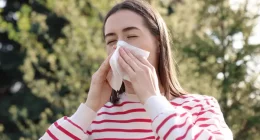Low oestrogen is common in menopausal women, but we also see it in young women of childbearing age, began Dr Vicki Peterson who spoke exclusively with Express.co.uk to offer her insight and tips on the condition. She continued: “Some people may experience symptoms like a UTI, painful intercourse and/or irritability, depression, and mood swings. The condition may be caused by malnutrition, an autoimmune disease, thyroid disease, long-term use of birth control pills or overexercising.”
According to Dr Peterson, lesser-known symptoms of the condition can include:
Weight gain
With insufficient oestrogen, your body burns and metabolizes starch and sugars less effectively.
The result is an increase in fat storage, decreased muscle mass and resultant weight gain, more predominantly in the abdomen.
Mood Swings and Depression
Oestrogen is a serotonin stabilizer. When levels decrease you are more likely to experience depression, irritability and mood swings.
Fatigue
Low oestrogen not only decreases your ability to deal with stress but also tends to burden your thyroid. The result is fatigue and lethargy.
READ MORE: Diabetes-Related Blindness: Biomarkers For Detecting Early Eye Changes Identified
Urinary Tract Infections and Vaginal Dryness
Oestrogen is needed to keep the tissues of the vagina healthy and the mucus lining stable and healthy. Lowered levels of it is not only result in vaginal dryness, but the reduced health of the mucus membranes open you up to opportunistic infection and can result in urinary tract infections.
Hot Flashes and Night Sweats
Lowered oestrogen affects your hypothalamus, the part of your brain that controls your internal temperature.
The result is hot flashes during the day and night sweats at night, resulting in disturbed sleep and insomnia.
DON’T MISS: Acupuncture To Relieve Bone-Related Chronic Pain
Oestrogen is commonly associated with the female body; however, men also produce oestrogen, but women produce it at higher levels.
It works in conjunction with calcium, vitamin D, and other minerals to keep bones strong. If your oestrogen levels are low, you may experience decreased bone density.
B vitamins, vitamin D, the herb black cohosh, chasteberry, evening primrose oil, ginseng, magnesium, and maca root, are natural supplements and foods to help with low oestrogen, added Dr Peterson.
“Also reduce your caffeine intake and learn to manage your stress better.”
Post source Daily Express





